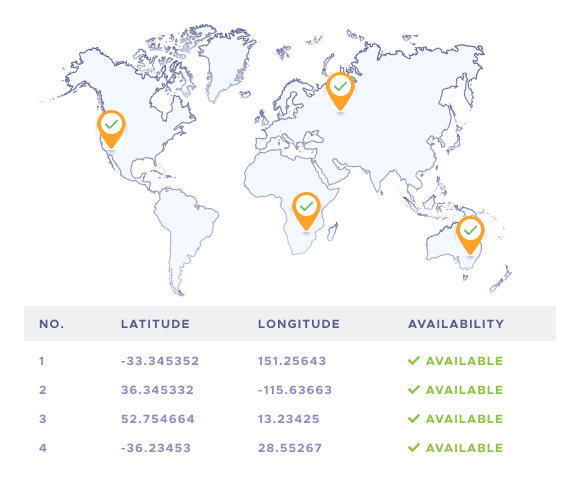The world's most accurate historical irradiance and weather data. 20+ weather parameters tailored to solar energy applications, from 2007 to 7 days ago. Available in JSON via synchronous API, or instant CSV web download.
CLOUD AND IRRADIANCE TRACKING
Tracking the world's clouds in the finest detail
Designed for Solar, from the ground up. Never rely on generic weather model data again. Solcast's real time and forecast data tracks and forecasts real clouds at a resolution of 1-2km and 5 minutes. Our irradiance and PV power data is updated every 5 to 15 minutes. Aerosol and albedo effects are explicitly treated.
WEATHER DATA
Full suite of high resolution weather data
Other weather data from leading reanalysis datasets completes the full suite of 20+ parameters available at 5, 10, 15, 30 and 60 minute resolutions. Coverage from 2007 to 7 days ago.
VALIDATION
We provide upfront and clear accuracy and validation information
Be confident that our data is fit for purpose.
Explore up to date, independent validation statistics at locations similar to your area of interest.
DATA ACCESS
Get data via synchronous API or instant CSV download
Synchronous API returns JSON data in 1-5 seconds per request, and requests can be submitted in parrallel up to your account rate limit.
Web downloads for up to 20 locations at at time. Choose from multiple file types including CSV, ready to use in your favourite simulation software.

Historical Time Series Data Specifications
| Geographic coverage | Global (note: far ocean and polar regions are coarser resolution) |
| Temporal coverage | January 2007 to 7 days ago (for past 7 days to present time and forecasts, use our Live and Forecast data) |
| Temporal resolution | 5, 10, 15, 30 & 60 minutes (period-mean values) |
| Spatial resolution | 2km (irradiance and cloud parameters, over all non-polar continental areas and nearby islands) 27km (other parameters, and polar or remote oceanic regions) |
| Data parameters | The following data parameters are available.
^ Clear-sky scenarios also available for these parameters |
| Data access | API or Web download |
| Download wait time | API: synchronous requests. Web download: seconds. |
| File formats | CSV, JSON, PVsyst, SAM, TMY3 |
| Data formats | Solcast standard, PVsyst (60 minute only) |
| Time zone | UTC, longitudinal, or user-specified fixed offset. |
Renewables Product Manager
CEO & Founder